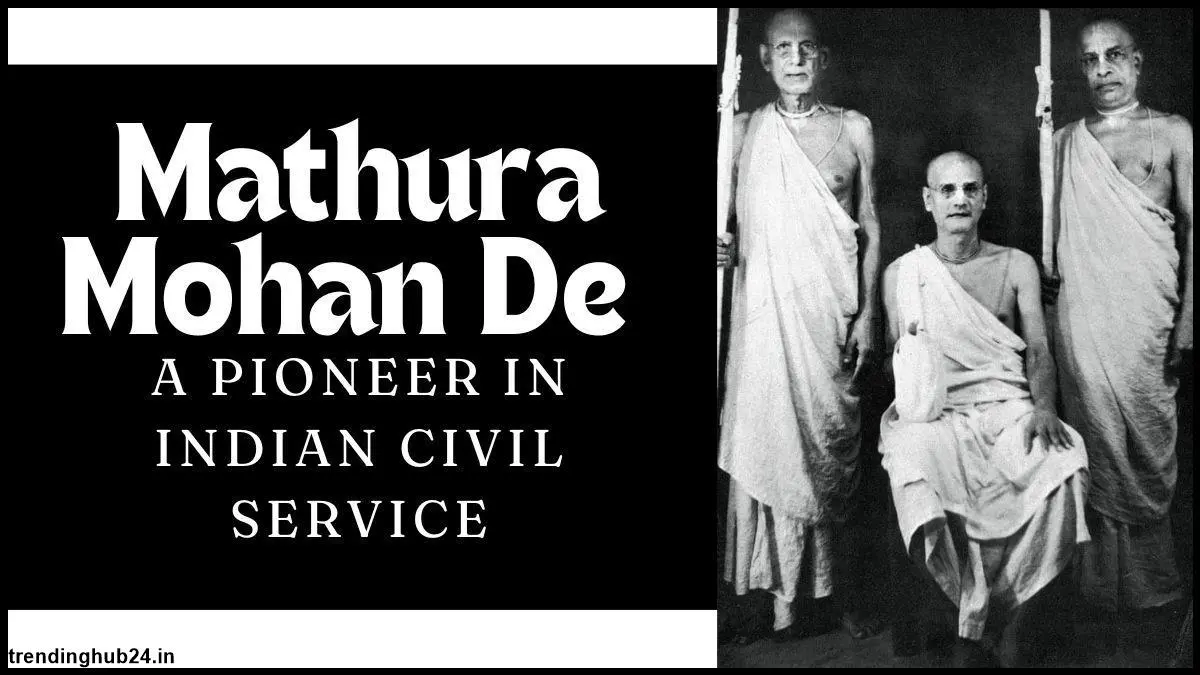🚀 Become a Verified Author on Trending Hub24
✍️ Author Account Available @ $60 / Month | +91 7355993756
Mathura Mohan De A Pioneer in Indian Civil Service

Mathura Mohan De was an honored Indian civil servant whose commitments to the Indian directorial frame and public service have left an enduring effect.
Table of Contents
Mathura Mohan De was an honored Indian civil servant whose commitments to the Indian directorial frame and public service have left an enduring effect. He was a trailblazer in multitudinous ways, especially with respect to English India, where Indian government workers were a unique case. This post is about the life and profession of Mathura Mohan De, featuring his achievements and legacy.
Early Life and Education
Mathura Mohan De was born in 1855 in Barisal, presently in Bangladesh, which was also under English rule. Coming from a family that esteemed instruction, Mathura Mohan showed outstanding commitment from early on. His family was important for the Bengali bhadralok, a class of tutored and constantly Westernized Indians who were necessary in the Indian Renaissance and changed developments during the 19th century.
Academic Pursuits
Mathura Mohan De sought after his training with perseverance and greatness. He went to the prestigious presidency college in Calcutta( presently Kolkata), which was a center of scholarly action and reformist ideas during the parochial time frame. There, he succeeded in his examinations, showing specific fitness in the humanities and regulation.
In the wake of finishing his training, Mathura Mohan progressed to concentrate on regulation, which was viewed as a huge field of study, especially for those seeking to join the common help. His educational achievements established the root for his unborn vocation in the Indian Civil Service (ICS), which was also prevalently staffed by English officers.
Joining the Indian Civil Service
In 1873, Mathura Mohan De fulfilled a huge achievement by brushing through the Indian civil service. This was veritably delicate, as the ICS was one of the most famed and Machiavellian tests of now is the ideal time. Also, the assessment was directed in London, and a couple of Indians had the option to get help, given the strategic and financial difficulties.
A Trailblazer Among Indian Civil Servants
Mathura Mohan De was among the early Indians to join the ICS, breaking ethnical and social obstructions. His entrance into the help was a demonstration of his keenness, tirelessness, and assurance to serve his nation under testing frontier conditions. As an ICS functionary, he demanded to explore a dominatingly English non-supervisory construction, where Indians were constantly consigned to bring down positions in malignancy of their capabilities.
Career and Contributions
Mathura Mohan De's career in the Indian civil service was set piecemeal by his commitment to non-supervisory change and public government backing. He served in different limits across English India, where he executed arrangements refocused on working on the subsistence of standard Indians. His work constantly elaborates on conforming the interests of the colonists association with the conditions of the local population
Regulatory Changes
Mathura Mohan De was known for his trials to achieve non-supervisory changes inside the parochial system. He pushed for the consideration of fresh Indians in the common backing, perceiving the significance of having overseers who comprehended the social settings of the areas they represented. His vision was to make a further delegate and effective non-supervisory frame that could more readily serve the Indian people.
Contribution to Education and Public Health
All through his profession, Mathura Mohan De put areas of strength on education and public health. He accepted that training was the way to engage people and networks, and he worked madly to grow instructional open doors in the locales he served. His trials included working on the frame of seminaries, expanding entrance to training for undervalued networks, and advancing the significance of instruction as a device for social portability.
In the sphere of public health, Mathura Mohan De was a supporter of present-day clinical practices and frames. He tried to further develop disinfection, lessen the spread of infectious affections, and guarantee that medical care administrations were open to all, especially in rural areas where medical services were constantly dismissed.
Championing Social Justice
Mathura Mohan De was likewise a protector of civil rights. He perceived the essential imbalances that were inside the pilgrim association and looked to address them through his work. He upheld drives refocused toward lessening impecuniousness and working on the livelihoods of the tyrannized, zeroing in on arrangements that advanced financial turn of events and social government backing.
Legacy and Impact
Mathura Mohan De's commitments to Indian culture and administration have made an endless imprint on the country's history. He was a colonist who prepared for people the future of Indian government workers, showing the way that Indians could succeed in the most elevated situations of the pilgrim association.
Role in the Indian National Movement
While Mathura Mohan De served in the colonist association, his work laid the medication for the Indian national movement. His emphasis on training, public government backing, and authoritative change resounded with the objects of the Indian Public Congress and other reformist organizations that looked for further noteworthy independence and tone- administration for India.
Inspiring Future Generations
Mathura Mohan De's heritage reaches out past his near commitments to public backing. He roused people in the future of Indians to seek professions in public service and administration, empowering them to pursue a more fair and just society. His life and work keep on filling in as a demonstration of the force of continuity, mind, and devotion to public help.
Personal Life and Values
Mathura Mohan De was known for his modesty, respectability, and obligation to moral norms. Despite his significant achievements, he remained grounded and focused on his mission to serve the people of India. His own rates were reflected in his expert life, where he reliably concentrated on the government backing of others above personal gain.
Family and Legacy
Mathura Mohan De's family progressed with his tradition of public backing and training. His cousins have added to different fields, including training, regulation, and social change, recapitulating the rates and rules that he supported during his continuance.
Bottom line!
Mathura Mohan De was a leading figure in the Indian civil service, whose commitments to policy perpetration and social change lastingly affected India's history. As one of the early Indian people from the ICS, he broke obstructions and set a trend for people in the future of Indian civil servants. His commitment to training, public health, and civil rights keeps on flourishing the people who try to have an effect in the public eye. Mathura Mohan De's life and work act as a wake-up call of the getting through force of administration, honesty, and the hunt for equity in putrefying a superior future for all.

